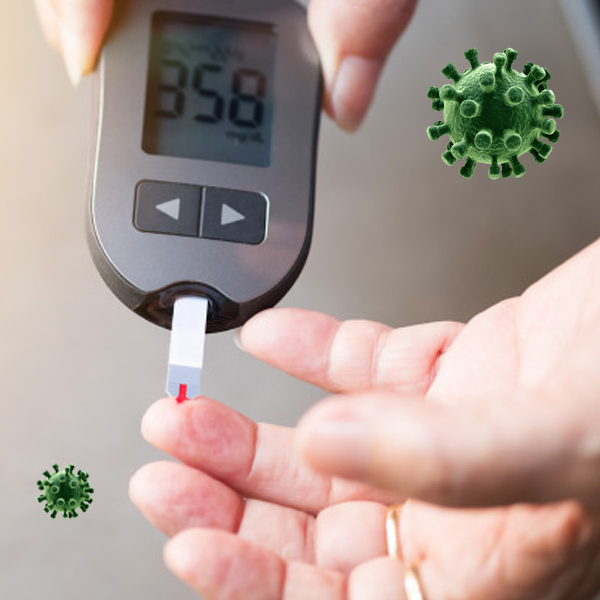
Covid-19: How To Stay Safe If You Have Diabetes
Covid-19 has spread its tentacles globally in a very rapid manner. Not only is the infection highly contagious, it is potentially fatal too. Thousands of deaths and new cases are being reported from various countries on a daily basis.
There are measures such as lockdown, curfew, social distancing and suspension of international or interstate travel etc being taken by governments in a number of countries. However, there are certain groups which are at a higher risk of getting infected compared to the young and healthy individuals. Patients suffering from chronic ailments such as Diabetes are among the categories which are more vulnerable to the virus.
Covid-19 risk for diabetics
There are two primary reasons why a diabetes patient might be more vulnerable to the viral infections.
1. The immune system in diabetics (Type 1 and 2 both) is weakened due to abnormal blood glucose fluctuations.
2. The enhanced blood glucose levels could be conducive for the viral growth in the body.
Thus, when people suffering from diabetes get infected, it becomes more difficult to treat them and the treatment period also becomes much longer.
Precautions Diabetics Should Take
Since Covid-19 is an unknown coronavirus which is still being studied by scientists all over the world and a vaccine for the virus is still some distance away, prevention is the best medicine for diabetic people. The World Health Organization has issued a set of guidelines and constant updates on the pandemic are being issued every alternate day. These instructions which are for the general public become even more significant for the diabetes patients and their family members/caregivers.
Here are some of the prescribed best practices that must be followed:
• Need to frequently and thoroughly wash your hands with a soap and water
• Since the virus can enter the body through mouth, nose and eyes, one has to be very careful about not touching the face before washing the hands and drying them.
• All objects and common use surfaces such as door knobs, handles, railings, countertops, taps etc should be regularly cleaned and disinfected to prevent contamination.
• While coughing or sneezing, you should cover your mouth and nose with either a handkerchief or a tissue. In case you don’ have a tissue handy then you can also cover your face with the crook of your arm. However, you shouldn’t cover your mouth or nose with your hands.
• Sharing of food, glasses, towels, phones and tools should be avoided.
• Make sure not to come into contact with anyone showing symptoms of any kind of respiratory problems or fever.
• You must never lose sight of the fact that these changes and precautions will go a long way in protecting yourself or your dear ones.
• In case you develop any respiratory illness or symptoms of flu then we advise you to stay home and isolate yourself from your family members.
Apart from taking such preventive measures, you must also pay adequate attention to your food and relaxation during these times. Eat nutritious food that boosts your body’s strength and immunity. Eating a balanced diet helps in controlling blood glucose levels and reduce your chances of getting infected. Fried foods and food items which have a lot of sugar, carbohydrates or fat should be avoided. Try to consume more of fruits and green , leafy vegetables.
A good diet is to be complemented with an active lifestyle. You must take walks (indoors or on terrace if you are not able to step outside due to the lockdown or curfew in your area). Regular exercise, yoga, meditation etc can be highly helpful in keeping you active, drive away obesity. These can also help in driving obesity away and boost your mental health.
Related FAQs
Everything You need to know about Outbreak of Novel Corona virus Infection in china
Coronavirus in India: Symptoms, Cases and Latest Updates
WHO declares Global Health Emergency -India’s first case of Coronavirus in Kerala
WHO Declares The Outbreak Of The Coronavirus As A Pandemic
COVID-19 or Coronavirus Declared as A Pandemic
Difference between Quarantine, Isolation and Social Distancing
101 With Hantavirus: Causes, Symptoms And Treatment
India Under Quarantine: Can It Block The Virus Progress?
British Prime Minister Boris Johnson Diagnosed with COVID 19
Can Coronavirus Risk Increase In Diabetic Patient
Diabetes and Coronavirus (COVID-19)
Coronavirus-Diabetics are more vulnerable By Dr. Manoj Chawla
Prevention from Coronavirus Infections
Coronavirus- Telemedicine for Diabetes patients
Coronavirus: Is India In Stage 3?
Should I Get Tested For Coronavirus?
COVID-19: The Impact On Human Immune System
COVID-19 in heart and Blood Pressure patient
COVID-19- Update for Heart and Blood Pressure patient
Coronavirus Pandemic: Current situation
Coronavirus And Skin Problems: Things You Must Know
COVID 19 And Kidney: Everything You Should Know
Corona Lockdown Extended To 3rd May 2020: Know Why
Covid-19: How To Stay Safe If You Have Diabetes
All That You Should Know About COVID-19 Or Coronavirus
Diabetes And Covid-19: Keep Calm And Stay Safe
Covid-19 Impact On Diabetes Patients: Things To Keep In Mind
Telemedicine: The Safest Mode Of Doctor-Patient Interaction During Covid-19
Everything you need to know about Russian Sputnik V Vaccine
Know the Difference Between Viral Fever and Coronavirus
New 'Double Mutant' Strain Of Covid-19 Detected In India
Will India See A Third Wave Of COVID -19?
Why is COVID Vaccination Important in India?
What are chances of Reinfection of COVID 19 in India ?
Are Children at Risk of Omicron?
Corona- Delta and Delta Plus Variants
Everything To Know About The Omicron Variant
Symptoms and Severity of Omicron: BA.4 and BA.5 | Medtalks
Another Milestone Reached: US Successfully Developers Covid Vaccine For Babies and Toddlers
Indian researchers find a new way to combat Covid-19
Covid-19 Infection Provides Protection against Reinfection for Roughly 10 Months
